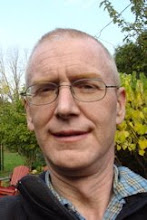- Polanyi, Michael. Tacit Knowledge in Prusak, Laurence. Knowledge In Organizations (Boston: Butterworth-Heinemann, 1997) at 135.
- This was copyright to Polanyi in 1966. In this brief essay/lecture he explores tacit knowledge as a theory. He has some structure of a theory of this type of knowledge. In this type of knowledge we assume we do not know what we known. This type of knowledge can not really be known but we do know it under the surface of our thinking. He makes his argument referring to psychological experiments. These were popular in the 1960's and earlier. He claims to show that positivist science is a failure as scientific method and says objectivity is not a possible way to know the world. Scientific knowledge is best known and originally know through tacit knowledge.
Sunday, June 28, 2009
I read one essay in Laurence Prusak's Knowledge in Organizations
The essay I read seemed the most theoretical and shortest in this book. The essay citation is:
Friday, June 26, 2009
I will be studying web semantics as my thesis optional course.
I am pumped about the optional course my supervisor has chosen for me to study. It is titled web semantics. I will learn about knowledge representation languages and ontological web languages (OWL). The course is at Carleton in the fall in the school of computer science. I ordered the textbook last night. I will get this textbook started early.
Sunday, June 21, 2009
I am beginning my mid month backups to a network drive.
I have been starting my backups to a network drive for the mid month. So far, I am working with Remembrance and the eMac.
I am also transferring my network music library to the new 1 TB drive.
I still have not fully transferred the first of the USB external drives to the network hard drive. It is not an easy process. There are always files that produce error messages and stop whole copy operations.
Saturday, June 20, 2009
To define knowledge is the task.
I read the definition of knowledge presented by probably the two most well known scholars of knowledge management this morning. Here is the citation and my notes on this chapter one definition:
- Davenport, Thomas and Prusak, Laurence. Working Knowledge: How Organizations Manage What They Know (Boston, Mass: Harvard Busines College, 1998).
Thursday, June 18, 2009
Feminist cyborg studies, robotics and statistics
I started to read this book this evening and got the introduction read and started the first chapter:
- Balsamo, Anne. Technologies of the Gendered Body: Reading Cyborg Women (Durham, N.C.: Duke University, 1996).
- This is a really interesting read so far. It has me questioning bodies. In particular, I am interested in my own body and my fingers and my finger work on bass guitar and computer keyboard. And of course, I must learn to be even more sensitive to the objectification of the female body.
I am now reading more about Mikhail Soutchanski's work and read his school web page today and sent him and e-mail asking him to direct me to his page listing knowledge representation languages.
I am also reading about JMP software in the book:
- Schlotzhauer, Sandra D. Elementary Statistics Using JMP (Cary, N.C.: Sas Institute, 2007).
- I have read and worked through chapters 1 to 3 and have started chapter 4 and can now consider myself a JMP user.
Sunday, June 14, 2009
I am slowly getting a paper about situational calculus by Mikhail Soutchanski read
I have read about 3 pages now in Gu, Liyan and Soutchanski, Mikhail. "The Two-Variable Situation Calculus" Frontiers In Artificial Intelligence and Applications 142, 2006. 144-161.
Friday, June 12, 2009
Following up my supervisor's suggestions on situational calculus finds robotics programmers.
My supervisor suggested I look up Mikhail Soutchanski. I did look him up today on google scholar and found his paper on situational calculus. I also found that he is part of a Ryerson-Toronto universities partnership in robotics programming. He seems to have only three or four papers out there so I am reading them now. This is real boy culture to be learning robotics programming. I see a good thesis topic change possibility here or at least some foundation for my simulation by strengthening my understanding of "agents" in a simulation. These agents can be conceptualized as software robots and fit well with my sociology of science and technology reading such as Brunto Latour's works.
Subscribe to:
Posts (Atom)
